|
|
|
Sort Order |
|
|
|
Items / Page
|
|
|
|
|
|
|
| Srl | Item |
| 1 |
ID:
123006
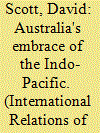

|
|
|
|
|
| Publication |
2013.
|
| Summary/Abstract |
This article argues that the 'Indo-Pacific' has become an increasingly influential term during the last few years within Australian strategic debate. Consequently, the article looks at how the concept of the 'Indo-Pacific' as a region is impacting on Australia's strategic discussions about regional identity, regional role, and foreign policy practices. The term has a strategic logic for Australia in shaping its military strategy and strategic partnerships. Here, the article finds that Australian usage of the term operates as an accurate description of an evolving 'region' to conduct strategy within, but also operates quite frequently (though not inevitably or inherently) as a more contested basis for China-balancing. The article looks closely at four themes: the Indo-Pacific as a term, the rhetoric (strategic debate) in Australia surrounding the Indo-Pacific term, the Indo-Pacific policy formulations by Australia, and the developing Indo-Pacific nature of bilateral and trilateral linkages between Australia, India, and the United States.
|
|
|
|
|
|
|
|
|
|
|
|
|
|
|
|
| 2 |
ID:
151697
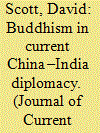

|
|
|
|
|
| Summary/Abstract |
Buddhism is being emphasised strongly in both Chinese and Indian public diplomacy, as they both seek to increase their soft-power attractiveness. This article finds that while Buddhism has served to draw the two countries together in their bilateral relationship, their current invocation of Buddhism as a bridge is in many ways an ahistorical reconstruction. The article also finds that Buddhism operates as a tool of diplomacy in a competitive way, as China and India both seek influence among Buddhist countries elsewhere in Asia and among international Buddhist organisations. Finally, this article finds that whereas China’s use of Buddhism is straightforwardly tactical and to a degree disingenuous, India is able to incorporate genuine spiritual elements into its use of Buddhism, albeit within a setting of Hindu reinterpretation of Buddhism. In the future, China could shift from a short-term tactical to a long-term normative use of Buddhism within international socialisation scenarios.
|
|
|
|
|
|
|
|
|
|
|
|
|
|
|
|
| 3 |
ID:
077212
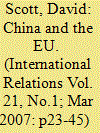

|
|
|
|
|
| Publication |
2007.
|
| Summary/Abstract |
The EU-China relationship is now emerging as a significant feature of the international system. The EU's institutional consolidation, development of supranational trade power and the foreign policy openings of the Common Foreign and Security Policy (CFSP) has entwined with the PRC's ongoing sense of geopolitical manoeuvrings between the superpowers. With its talk of 'multipolarity', grand strategy has converged, though the PRC's stress on 'multipolarity' can perhaps be distinguished from the EU's stress on 'multilateralism'. Nevertheless, human rights issues apart, the EU-China relationship has matured in the last two decades to involve significant economic matters and visions of a wider 'strategic partnership', bringing with it a challenge to American unipolar unilateralism
|
|
|
|
|
|
|
|
|
|
|
|
|
|
|
|
| 4 |
ID:
096833
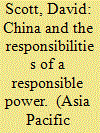

|
|
|
| 5 |
ID:
078381
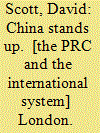

|
|
|
|
|
| Publication |
London, Routledge, 2007.
|
| Description |
x, 212p.
|
| Standard Number |
0415402700
|
|
|
|
|
|
|
|
|
|
|
|
Copies: C:1/I:0,R:0,Q:0
Circulation
| Accession# | Call# | Current Location | Status | Policy | Location |
| 052537 | 327.51/SCO 052537 | Main | On Shelf | General | |
|
|
|
|
| 6 |
ID:
139827
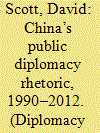

|
|
|
|
|
| Summary/Abstract |
During Hu Jintao’s period of leadership, careful public diplomacy language was deployed by the People’s Republic of China from 2000–2012 to describe the international system and China’s role within it. The terms looked at in this analysis are those introduced in the 2000s to recalibrate the ‘multi-polarity’ [shijie duojihua] emphasis of the 1990s. These terms have been deployed within a general ‘reassurance diplomacy’ that emphasised concepts like ‘responsible Great Power’ [fuzeren da guo], ‘multi-lateralism’ [duobian zhuyi], ‘good neighbourhood policy’ [mulin zhengce], ‘democratisation of international relations’ [guoji guanxi mingzhuhua], ‘peaceful rise’ [heping jueqi], ‘peaceful development’ [heping fazhan] and ‘harmonious world’ [hexie shijie]. Ambiguities, implications, impact, and tensions surrounding these terms are considered, and China’s deliberate adjustments pinpointed. China’s soft power intentions emerge from its instrumentalist use of diplomatic rhetoric, though a credibility gap also emerged between actions and words by 2012.
|
|
|
|
|
|
|
|
|
|
|
|
|
|
|
|
| 7 |
ID:
077409
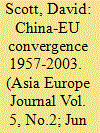

|
|
|
|
|
| Publication |
2007.
|
| Summary/Abstract |
This article looks at how the 'strategic partnership' announced in 2003 between the People's Republic of China and the European Union came to be. Strategic geopolitical balancing and containment towards other third parties have been prominent features of their convergence, during a period when the EU developed more of a foreign policy dimension and China continued its economic surge. To some extent both actors in various ways began to see each others as partners in dealing with the Soviet Union and with the United States, and helping their own rise in the international system. Strategic convergence has taken place, though one could still notice China's emphasis on geo-politics and multipolarization and the EU's greater stress on geo-economics and multilateralism
|
|
|
|
|
|
|
|
|
|
|
|
|
|
|
|
| 8 |
ID:
117653
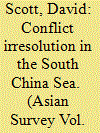

|
|
|
|
|
| Publication |
2012.
|
| Summary/Abstract |
In the South China Sea dispute, some Track-2 settings, along with Track-1 efforts by ASEAN and China, have facilitated some conflict "management." But they have not brought about conflict "resolution" of the basic sovereignty and control issues. Conflict "irresolution" has ensued instead. Short-term balancing may perhaps generate long-term socialization convergence.
|
|
|
|
|
|
|
|
|
|
|
|
|
|
|
|
| 9 |
ID:
088756
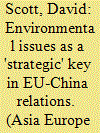

|
|
|
|
|
| Publication |
2009.
|
| Summary/Abstract |
EU-China relations face some troubled areas, notably their differing views on human rights and a widening trade imbalance in China's favour, compounded by the still weak foreign policy coherence on the part of the EU. This raises problems for the EU-China strategic partnership announced in 2003. This paper argues that, in contrast to such problematic political-trade areas, there is some substantive convergence over environmental and energy issues. Convergence is evoked in the EU-China Partnership on Climate Change announced in 2005, and manifested in various cooperative programmes currently operating. In a practical sense, environmental issues are not only important in themselves but are ones where easier confidence and pragmatic cooperation can be more readily established between the EU and China. However, questions of appropriate environmental technology, the commercial/altruistic basis for technology transfer and outcomes of the Copenhagen Climate Change Conference in December 2009 remain as issues to settle between them.
|
|
|
|
|
|
|
|
|
|
|
|
|
|
|
|
| 10 |
ID:
107757
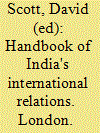

|
|
|
|
|
| Publication |
London, Routledge, 2011.
|
| Description |
xxviii, 341p.
|
| Standard Number |
9781857435528, hbk
|
|
|
|
|
|
|
|
|
|
|
|
Copies: C:1/I:0,R:1,Q:0
Circulation
| Accession# | Call# | Current Location | Status | Policy | Location |
| 056246 | 327.54/SCO 056246 | Main | On Shelf | Reference books | |
|
|
|
|
| 11 |
ID:
088715
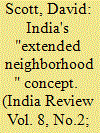

|
|
|
| 12 |
ID:
122926


|
|
|
|
|
| Publication |
2013.
|
| Summary/Abstract |
India has increasingly high aspirations in the Indian Ocean, as enunciated by politicians, naval figures and the wider elite. These aspirations, its strategic discourse, are of pre-eminence and leadership. India's maritime strategy for such a self-confessed diplomatic, constabulary and benign role is primarily naval-focused; a sixfold strategy of increasing its naval spending, strengthening its infrastructure, increasing its naval capabilities, active maritime diplomacy, exercising in the Indian Ocean and keeping open the choke points. Through such strategy, and soft balancing with the United States, India hopes to secure its own position against a perceived growing Chinese challenge in the Indian Ocean.
|
|
|
|
|
|
|
|
|
|
|
|
|
|
|
|
| 13 |
ID:
121400
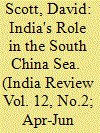

|
|
|
|
|
| Publication |
2013.
|
| Summary/Abstract |
This article looks at the South China Sea, an area of dispute between China and other littoral states, as a new area of geopolitical and geoeconomic interest for India. The article follows the strategic discourse on the South China Sea circulating in the Indian government and wider strategic community, and brings in Chinese responses and interpretations of India's involvement. India's role in the South China Sea is four-fold: first, naval deployments; second, increasing strategic-military links with littoral states like Singapore, Indonesia, the Philippines, and Vietnam; third, economic involvement of Indian energy companies in South China Sea waters; and fourth, discussions between India and other regional and extra-regional China-concerned powers about the South China Sea. India's involvement in the South China Sea represents a new development in its Look East Policy, a new balancing factor in the interplay of actors within these waters, and a new friction factor within India-China relations.
|
|
|
|
|
|
|
|
|
|
|
|
|
|
|
|
| 14 |
ID:
116292
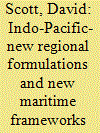

|
|
|
|
|
| Publication |
2012.
|
| Summary/Abstract |
This article argues three things. First, it argues that at the conceptual level there has been a strategic rediscovery of a maritime regional framework, the Indo-Pacific. Second, it argues that at the policy level there is a significant regional security convergence, a degree of strategic balancing, between India and the United States in this Indo-Pacific. Third, it argues that at the causal level there is a common maritime challenge from China faced by India in the Indian Ocean and by the United States in the Pacific Ocean, a common Indo-Pacific strategic challenge which is generating this significant US-India naval convergence. In order to deal with such matters, the article looks at the strategic discourse employed around the concept of the Indo-Pacific, and the related maritime assets deployed in the Indo-Pacific by the United States and India.
|
|
|
|
|
|
|
|
|
|
|
|
|
|
|
|
| 15 |
ID:
110205
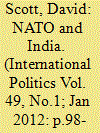

|
|
|
|
|
| Publication |
2012.
|
| Summary/Abstract |
In this article, I argue that after having experienced a distinctly cool relationship throughout most of the post-war period and for the 10 years following the end of the Cold War, India and North Atlantic Organization (NATO) are now gradually moving towards each other. Indeed, during the past decade, NATO's 'out-of-area' operations have taken it eastwards from the Mediterranean, while India's 'extended neighbourhood' framework has brought it westwards from the Indian subcontinent. This has created a geopolitical overlap between these two actors, most notably in Afghanistan but also elsewhere in the Indian Ocean. Common advocacy of liberal democracy and overt concerns over jihadist destabilization have brought these two actors together. In NATO's post-Cold War search for relevance and India's post-Soviet search for partners, they have found each other. Unstated potential concerns over China are also a feature in this strategic convergence. However, while NATO has adopted a flexible range of 'Partnership' frameworks, India's sensitivity on retaining 'strategic autonomy' will limit their cooperation to informal ad hoc arrangements.
|
|
|
|
|
|
|
|
|
|
|
|
|
|
|
|
| 16 |
ID:
153839


|
|
|
|
|
| Summary/Abstract |
The article looks at the rise of India from UK perspectives, a rise and response which are driven by economics. Five themes are pursued, namely the pre-2002 legacy of the past, the 2002–2016 developing partnership, the politics of the current relationship, the economics of the relationship, and the post-Brexit future. With regard to the pre-2002 legacy of the past there is the colonial legacy that both draws the two countries together, yet also leaves friction points of perspectives and sensitivities. The 2002–2016 developing partnership deals with the progress and process of UK–India links during the Blair, Brown and Cameron periods. With regard to the current economics of the relationship, India's economics-driven rise made it a potential magnet for British exports and for two-way investments, and an alternative to China for the UK. With regard to the current politics of the relationship, the disappearance of the Soviet Union had left the way for convergence of two English speaking liberal democracies, who share important anti-terrorism and anti-jihadism concerns. However, while trade has increased between the UK and India, its volume level has not met expectations, and UK exports have lagged back, thereby leaving a growing trade deficit. Future UK–India relations are dramatically being reshaped by the Brexit referendum vote for the UK to leave the EU, and with it the prospects of a UK–India Free Trade Agreement being negotiated. However, while the economics and politics of the relationship make India increasingly important to the UK, it leaves the UK of secondary importance to India.
|
|
|
|
|
|
|
|
|
|
|
|
|
|
|
|
| 17 |
ID:
083821
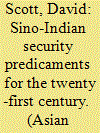

|
|
|
|
|
| Publication |
2008.
|
| Summary/Abstract |
This article considers various security predicaments affecting relations between India and China. These Sino-Indian security predicaments include their territorial dispute, their nuclear arms race, their encirclement and alignment scenarios, their trade and energy issues, and their future prospects. International relations (IR) theory is deployed around these varied security predicaments, with power and perception particularly evident in IR realism, geopolitics, constructivism, and security dilemma dynamics. Balance-of-power theory is complemented by balance-of-threat considerations. India's hedging strategy towards China and China's own strategy of transition point to each country looking to their own respective rise for the mid century.
|
|
|
|
|
|
|
|
|
|
|
|
|
|
|
|
| 18 |
ID:
076868
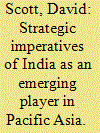

|
|
|
|
|
| Publication |
2007.
|
| Summary/Abstract |
India's links to the Pacific have gradually emerged in the last decade. Initially this was seen in the Look East policy enunciated in the early 1990s. This policy was rather limited in scope in terms of its emphasis mostly on economic relations with the ASEAN countries. However, the last decade has seen India move beyond such ASEAN, Southeast Asia economic horizons. Its Look East policy has entered 'phase-2'. Consequently, India has become further involved in military-security power projection, particularly through naval deployments and maritime diplomacy. India has also moved into wider East Asia (Pacific Asia) and Pacific Basin (southern Pacific) settings. In doing so rivalry with China is evident, as is balancing with other Pacific actors like Japan and the US. Whilst India's drive in the Indian Ocean remains more noticeable and manifest, this has spilled further eastwards. India has thus become a Pacific player and a factor within the Pacific Asia balance of power
|
|
|
|
|
|
|
|
|
|
|
|
|
|
|
|
| 19 |
ID:
129630


|
|
|
|
|
| Publication |
2014.
|
| Summary/Abstract |
This article looks at matters of trust, of structures and of dialogue in the European Union (EU)-China relations. It argues that EU-China relations need resetting given the increasingly negative perceptions of China in Europe and given Chinese dissatisfaction with what it considers to be a degree of EU incoherence, incompetence and inconsistencies. Their 'strategic partnership' proclaimed in 2003 in many ways is rather empty and lacks much coordination of diplomacy. Their economic relationship while substantial is problematic and asymmetric in nature. However, restructuring the relationship through new dialogue mechanisms and agreements may resettle their relationship along more pragmatic functional grounds. In particular, the creation in 2012 of a third High Level Dialogue, at Track-2 rather than Track-1 level, that of People-to-People (PPD), may reduce the 'trust deficit' in the still longer term. Consequently, the article seeks to contextualize and evaluate the rhetoric and substance surrounding the various dialogue meetings and structures emerging in 2012. It also considers the progress, or perhaps lack of progress, on concluding a Partnership and Cooperation Agreement (PCA). It concludes that one way forward is to de-politicize the partnership.
|
|
|
|
|
|
|
|
|
|
|
|
|
|
|
|
| 20 |
ID:
115043
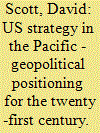

|
|
|
|
|
| Publication |
2012.
|
| Summary/Abstract |
This article seeks to apply IR theory to the US presence in the Pacific. It analyses the ways in which geopolitical considerations of position are at the heart of US security strategy in the Pacific. It argues that America's long-term security position in the Pacific is a basic geopolitical matter; be it in terms of traditional geopolitics (regional position as "location") and in terms of critical geopolitics (regional position as "power and aspirations"). In looking at US security strategy in the Pacific, three geopolitical features are noticeable: (1) Mahanian seapower tenets, (2) overlapping competitive US-China concerns focused around the two island chains in the Western Pacific, and (3) the internal balancing carried out by the US in the Pacific which is particularly focused on Guam.
|
|
|
|
|
|
|
|
|
|
|
|
|
|
|
|
|
|
|
|
|